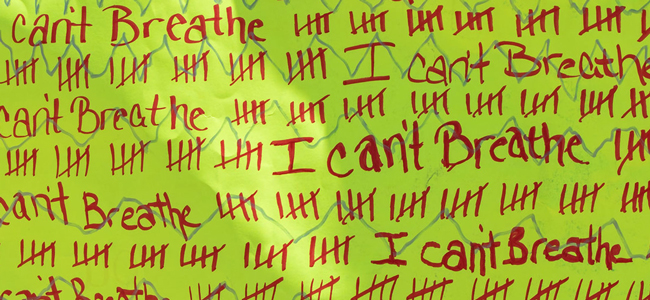Violence in Blue: The 2020 Update
 In March, 2016, Granta published “Violence in Blue,” by HRDAG’s director of research Patrick Ball. In the article Patrick asserts that one-third of all Americans killed by strangers are killed by police.
In March, 2016, Granta published “Violence in Blue,” by HRDAG’s director of research Patrick Ball. In the article Patrick asserts that one-third of all Americans killed by strangers are killed by police.
In the wake of the police killing of George Floyd and scores of other black Americans in all too recent history, demonstrations in the United States and around the world are demanding changes in policing. Granta has refreshed the 2016 article with a new introduction by Patrick, which we reproduce here.
“The largest public demonstrations in a generation are at this moment demanding reform or abolition of the police in the United States. The overwhelming and destabilizing violence by police against protesters has been egregiously disproportionate to the threats to property posed by a tiny minority of the demonstrators. Thanks to cell phone video and media coverage, Americans seem to be noticing, and there may be sufficient political momentum for meaningful change.
It is essential in this moment to remember how authorities will respond to this pressure. Always, those authorities will claim that their extraordinary powers are necessary to protect us from various threats, some real and others invented to fuel racist fantasies. Always, they will divert arguments about the unjust use of their awesome powers to blame their opponents and demonstrators. This week’s example is the police argument that damage to property justifies tear gas, indiscriminate beatings and the wholesale suppression of democratic guarantees of free speech and assembly. But according to many police officials, ‘a few’ – perhaps quite a few – abusive officers require no response, no civilian oversight, no one fired, no one even suspended, let alone prosecuted, no budgets reduced, no replacement of police powers with social services.
This cannot be acceptable in democracy. The Universal Declaration of Human Rights states in the preamble that ‘if man [sic] is not to be compelled to have recourse, as a last resort, to rebellion against tyranny and oppression, that human rights should be protected by the rule of law.’ That’s the deal. We consent to police powers because police promise to protect human rights and uphold the law, fairly and using only the minimum of force. We hold the police accountable for the use of their massive powers because unjust violence by the state threatens the basis of our entire society. We hold the state, we hold police and soldiers, to a far higher standard than we hold citizens because there is so much at stake.
This article was originally published in 2016 based on a statistical analysis led by Dr Kristian Lum. It was largely a response to the demonstrations demanding justice for the 2014 police killing of Michael Brown in Ferguson, Missouri – and to the government’s tiny and ultimately inconsequential effort at reform.
For generations, black Americans have demanded reform: law enforcement’s unjust violence against their community must stop, and the offending officers must be prosecuted. There has been little if any improvement. As white supremacists have infiltrated US law enforcement in recent years, policing against black Americans may well have become even less just. For the moment, non-black Americans are paying attention. I pray that this time we will see meaningful change in US policing.”
Image: Photo by Flickr contributor Paul Becker / Becker1999, CC-By-2.0 / modified by David Peters. The tally marks on this poster show the timing of George Floyd’s repeated pleas during the last 540 seconds of his life.
